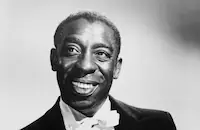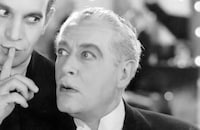Rain or Shine

Brief Synopsis
Cast & Crew
Frank Capra
Joe Cook
Louise Fazenda
Joan Peers
William Collier Jr.
Tom Howard
Photos & Videos
Film Details
Technical Specs

Synopsis
Although bareback rider Mary Rainey frets over the overdue bills that have been incurred by the struggling Greater John T. Rainey Circus, a concern she inherited from her father, her fast-talking manager "Smiley" Johnson reassures her that her debts are easily overcome. Mary also receives encouragement from her sweetheart, Bud Conway, a neophyte circus employee, whose father owns half of Shrewsbury, the next town on the circus' touring schedule. When the circus arrives in Shrewsbury, Smiley is confronted by Amos K. Shrewsbury, a simple but prosperous feed store owner to whom the circus owes $240. Using his skills as a confidence man, Smiley talks Amos into paying him $300 to become a partner in the circus, then gives the rube $240 of his own money as payment for the feed bill. Later, Smiley convinces Amos to invest an additional $4,700 in the failing circus and solves a lion feeding crisis by telling a group of children that if they bring him a pound of meat from home, they will receive free admission to the next performance. Bud then informs Mary that his parents are anxious to meet her and have planned a banquet in her honor. While Mary asks Smiley to the banquet, Bud, who hopes that his father will invest in the circus, invites several performers, including ringmaster Dalton. At the banquet, Smiley, who secretly loves Mary, conspires with Dave, the Shrewsbury dimwit, to mock his upper-class hosts. Infuriated by their guests' outrageous behavior, the Conways storm from the dinner in a huff, and a humiliated Mary denounces Smiley. The next day, Mary fires Smiley and hires Dalton as her new manager, unaware that he and Foltz, the lion tamer, are plotting to take over the circus. Although a large crowd shows up at the circus that sunny afternoon, all of the ticket sales money is impounded by the Shrewsbury sheriff. Just as the show is to begin, Dalton and Foltz incite the performers, who have not been paid in four weeks, to strike. As Mary struggles to keep the audience in their seats, Smiley sees Bud, who was unable to extract any money from his parents, driving madly back to the circus. Moments after Mary signs Dalton's agreement, however, Smiley arrives and rips up the contract. He then convinces some of the striking acts to go on without pay, while ordering other employees to give impromptu performances. Although Smiley and Dave's acrobatic and juggling act is a hit, Dalton and Foltz agitate the audience to storm the ring. Soon a riotous confrontation ensues, and one of the tents is accidentally set on fire. As the fire jumps from tent to tent, Smiley rescues Mary, who has been caught in a tent rope, from the burning big top. The next day, Smiley, Amos and the decimated but still beating circus gather themselves together and, as the rain pours down, ride to their next engagement.

Director

Frank Capra
Cast
Joe Cook

Louise Fazenda
Joan Peers
William Collier Jr.
Tom Howard
Dave Chasen
Alan Roscoe
Adolph Milar

Clarence Muse

Edward Martindale
Nora Lane
Tyrrell Davis
James J. Jeffries
Crew
Milton Ager
Bakaleinikoff
E. L. Bernds
Frank R. Capra
Harry Cohn
Dorothy Howell
John P. Livadary
Sam Nelson
Jo Swerling
Joseph Walker
Maurice Wright
Jack Yellen

Photo Collections
Film Details
Technical Specs

Articles
Rain Or Shine - Rain or Shine
Based on a 1928 hit Broadway musical of the same name by James Gleason and Maurice Marks, Rain or Shine was the story of a circus manager trying to make a success of his traveling show despite bad weather, internal saboteurs, poor business and creditors. At first Cohn had rejected the idea telling Capra, "I can't spend that kind of dough. Musical comedies cost a fortune to produce!" Cohn, however, changed his opinion when the director told him he'd throw out the musical numbers because he wanted to buy Rain or Shine for different reasons. "We're buying Joe Cook," Capra told him. "He's mad, Harry. He's unique - the darling of the literati, of the Algonquin Round Table! Percy Hammond calls Cook 'the funniest man in America'; Brooks Atkinson says he's 'one of the greatest comedians of our times!' And we're buying two other great comedians in Rain or Shine - Tom Howard and Dave Chasen. Rain or Shine will cost us peanuts, Harry. I'll shoot it all in a small two-ring circus tent. No other sets. No music, no chorus dames, no Busby Berkeley, no nothing. Just wild comedy."
After Cohn agreed to the purchase, Capra hired Jo Swerling and Dorothy Howell to rewrite Rain or Shine for the screen, removing all the musical numbers as promised and expanding a romantic subplot in which the circus owner, Mary Rainey (Joan Peers), hopes to marry Bud Conway (William Collier, Jr.), a new employee whose wealthy, class-conscious parents disapprove of his current vocation. The real focus of the film though is "Smiley" Johnson (Joe Cook), the fast-talking manager of the Greater John T. Rainey Circus and his never-ending schemes and hustles to keep the circus operational and true to its promise to offer two shows a day, rain or shine. Dalton (Alan Roscoe), the ringmaster, proves to be the villain of the piece, working secretly to foil Smiley's efforts. Meanwhile, a befuddled investor, Amos K. Shrewsbury (Tom Howard) and Dave (Dave Chasen), a food vendor and roustabout, provide comic relief.
Some of Rain or Shine was filmed at the Burbank, California ranch of James J. Jeffries, a former world heavyweight boxing champion who also has a cameo in the film. Acts and members of the A. W. Copeland Circus were featured as part of the supporting cast and some of the incidental and background music from the Broadway score by Milton Ager and Jack Yellen was reused for the film.
Seen today, Rain or Shine is a curiosity and not typical of the Frank Capra films that would follow. More than anything it is truly a showcase for Joe Cook's unique vaudeville talents and motormouth character and at times the humor is as raucous and unruly as the early Marx Brothers comedies with an emphasis on zany dialogue and wordplay. Yet you can see glimpses of Capra's emerging populist viewpoint that would flower in Platinum Blonde (1931) and American Madness (1932). In his biography, Frank Capra: The Catastrophe of Success, Joseph McBride wrote that "Rain or Shine gives mixed political signals, probably because of the clash of Capra's fundamentally conservative attitudes with more liberal ideas that were in the air at the time. The precarious financial state of the circus echoes the state of the country, and Cook's Smiley, the indefatigable optimist, can be seen as a Franklin Roosevelt precursor, galvanizing the demoralized troupe with his energy and courage. His black organist, Nero (Clarence Muse), plays an instrumental version of "Happy Days Are Here Again," the Broadway show's pep tune that FDR would adopt as his theme song in the 1932 presidential campaign."
Easily the most memorable sequence in the film is the fiery climax when the angry circus patrons cause a riot which starts a blaze that eventually consumes the big top and reduces it to ash. Sound technician Edward Bernds later said, "Working with Frank Capra, I soon realized what a wealth of guts and daring he had! In Rain or Shine, for instance, he very casually burned down an entire circus! It was a one-shot thing. He just put enough cameras on to cover everything he wanted and he burned the whole thing down. He shot it with, as I recall, about a dozen cameras. He had guts and originality!"
Rain or Shine proved to be a modest success at the box office and some critics even stated that Capra had improved upon the original Broadway show, making it even funnier. The Variety reviewer wrote, "A circus story with plenty of comedy, much sightlines, a thrill or so and a real big top fire for the finale make Columbia's Rain or Shine with Joe Cook a first run candidate. It's a much better than average circus picture....Joe Cook's ready reasons for anything get a laugh here whenever used, as does Cook's mannerisms and his general work...Toward the finish the story does go a little ragged and without a smooth finish, but that doesn't injure the whole impression."
Capra would move on next to Dirigible (1931), an action-adventure picture with a love triangle, but Joe Cook, the real star of Rain or Shine, never quite clicked with movie audiences like he did with theatergoers. A veteran circus performer, he made a handful of comedy shorts and features after the Capra film but was struck down by Parkinson's disease at an early age and was forced to retire from show business in the early forties (he died in 1959). As for Dave Chasen, who had appeared in numerous vaudeville shows with Cook and a few comedy shorts, he is more famous today as the restaurant owner who opened Chasen's in Hollywood in 1936. Famous for his chili, which was so loved by Elizabeth Taylor that several orders of it were flown to Rome for her during the making of Cleopatra (1963), the restaurant was a mainstay for years and popular with such celebrities and dignitaries as Frank Sinatra, Groucho Marx, Alfred Hitchcock and President Ronald Reagan. Chasen's was located at 9039 Beverly Boulevard in Los Angeles and closed down in 1995.
Producers: A Frank R. Capra Production, Harry Cohn
Director: Frank R. Capra
Screenplay: Jo Swerling (dialogue and continuity); Dorothy Howell (dialogue and continuity); James Gleason and Maurice Marks (book)
Cinematography: Joseph Walker
Art Direction: Harrison Wiley (uncredited)
Film Editing: Maurice Wright
Cast: Joe Cook (Smiley Johnson), Louise Fazenda (Frankie - 'The Princess'), Joan Peers (Mary Rainey), William Collier, Jr. (Bud Conway), Tom Howard (Amos K. Shrewsberry), Dave Chasen (Dave), Alan Roscoe (Dalton - the Ringmaster), Adolph Milar (Foltz - the Lion Tamer), Clarence Muse (Nero), Nella Walker (Mrs. Conway), Edward Martindale (Mr. Conway), Nora Lane (Grace Conway), Tyrrell Davis (Lord Hugo Gwynne).
BW-89m.
by Jeff Stafford
SOURCES
Frank Capra: The Catastrophe of Success by Joseph McBride (St. Martin's Griffin)
The Name Above the Title by Frank Capra (Da Capo Press)
The Films of Frank Capra by Victor Scherle, William Turner, & William O. Douglas (Citadel)
www.afi.com
IMDB

Rain Or Shine - Rain or Shine
Quotes
Trivia
Notes
Although Ager and Yellen's score from the stage show was adapted and re-used for the film, none of their songs are performed in the movie. Instrumental versions of the musical's songs, including "Rain or Shine" and "Happy Days Are Here Again," are heard only as background music in the film. Joe Cook, Tom Howard and Dave Chasen appeared in the original Broadway production of the musical and recreated their stage roles for this film. Cook made his screen debut in this film. According to a studio publicity item, scenes for the film were shot at the Burbank, CA ranch of former world heavyweight boxing champion James J. Jeffries. Jeffries appears as an extra in the film. A May 1930 Film Daily news item states that the A. W. Copeland Circus was to appear in the film. A studio publicity item confirms that Columbia erected a circus on Jeffries' land. Modern sources state that to film the final fire sequence, Capra burned down the entire circus and used several cameras to photograph sufficient footage of the fire. Modern sources list Harrison Wiley as the art director.














